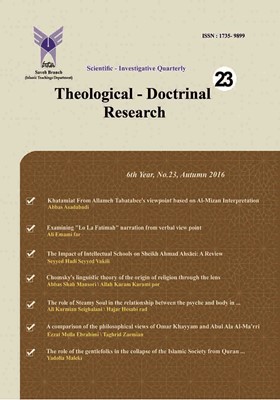The role of Steamy Soul in the relationship between the psyche and body in Avicenna's philosophical psychology
Subject Areas : Islamic theology
1 -
2 -
Keywords: the relationship between the psyche and body, the steamy soul, the origin of steamy soul, of steamy soul ranks, steamy soul belonging,
Abstract :
Avicenna is one of the Muslim philosophers among philosophers who has been given attention to the relationship between the psyche and body. Since he believes that the soul is spirituality created and he believes that the duality of body and psyche is from the beginning of creation. He is obliged to accept a mediator in the issue of the existence of a relationship between body and psyche because the spiritual and immaterial psyche cannot be connected to a dirty body and an element without a mediator. Therefore, the existence of a tender mass which is above the body and low psyche is necessary. Avicenna calls this mediator the steamy soul. The steamy soul arises from the tender part of humours and body steams. Therefore, the steamy soul proportion to the tender part of humours is similar to the proportion of the concentration of humours. As the combination and humours misciblity in every part of body parts develop the temperament which fits that particular organ, steams and tenders which have arisen from quadruple humours are combined and miscibled and develop the temperament which fits the steamy soul. Therefore, thinking, employment and interest of the psyche to the body and any of body parts or body organs will be in this way. From Avicenna’s perspective, the first member which take soul is the heart. heart is the source and mine of , the steamy soul birth. The present paper addresses content analysis method to introduce Avicenna’s perspective about the steamy soul, its origin and reason for its existence, functions and its role in sensory perceptions
۱. ابن سینا، حسین ابن عبدالله، (1375)، الاشارت و التنبیهات مع الشرح لنصیر الدین طوسی و شرح لقطب الدین رازی، ج2، قم: النشر البلاغه، اول.
۲. ابن سینا، حسین بن عبدالله، (1363)، الشفا، الالهیات، مقدمه ابراهیم مدکور، تحقیق الاب قنواتی و سعید زاید، تهران: انتشارات ناصر خسرو.
۳. ابن سینا، حسین بن عبدالله، (1363)، المبدا و المعاد، تهران: انتشارات موسسه مطالعات اسلامی مک گیل.
۴. ابن سینا، حسین بن عبدالله، (1375)، النفس من کتاب الشفا، تحقیق حسن حسن زاده آملی. قم: التابع لمکتب الاعلام الاسلامی، اول.
۵. ابن سینا، حسین بن عبدالله، (1359)، رساله عیون الحکمة، بیروت لبنان: انتشارات دارالقلم.
۶. ابن سینا، حسین بن عبدالله، (1383)، رگ شناسی یا رسالهای در نبض، مقدمه، تصحیح و حواشی محمد مشکوه، همدان: همدان دانشگاه بوعلی سینا، تهران انجمن آثار و مفاخر فرهنگی.
۷. ابن سینا، حسین بن عبدالله، (1395)، الشفاء، الطبیعیات، ج3 الحیوان، قم: کتابخانه عمومی حضرت آيت الله العظمی مرعشی نجفی .
۸. ابن سینا، حسین بن عبدالله، (1395)، الشفا، الطبیعیات، ج2، النفس، المصر: الهیئة المصریة العامة للکتاب.
۹ آیتی، عبدالحمید، (1373)، تاریخ فلسفه در جهان اسلامی (ترجمه تاریخ فلسفة العربیة)، تهران: انتشارات علمی فرهنگی.
۱۰. حسن زاده آملی، حسن، (1385)، عیون مسایل نفس و شرح آن در شصت و شش موضوع روانشناسی (سرح العیون فی شرح العیون)، قم: بکا.
۱۱. خان، احمد، (1383)، تفریح القلوب: ترجمه فارسی رساله ادویه قلبیه ابن سینا، تهران: موسسه مطالعات تاریخ پزشکی، طب اسلامی و مکمل: دانشگاه علوم پزشکی و خدمات بهداشتی درمانی ایران.
۱۲. سبزواری، ملاهادی، (1369-1376)، شرح منظومه با تعلیقه علامه حسن زاده آملی، تهران: نشر ناب.
۱۳. سجادی، سید جعفر، (1373)، فرهنگ اصطلاحات فلسفی ملاصدرا، ج2.
۱۴. شاهرخی، احمد رضا، (1381)، ارتباط نفس مجرد و بدن در فلسفه اسلامی، قم: پژوهشهای فلسفی ـ کلامی، ج13و14.
۱۵. شرفکندی، عبدالرحمان، (1370)، قانون در طب (ترجمه قانون فی طب ابن سینا)، تهران: انتشارات سروش.
۱۶. شیرداغی، محمد اسحاق عارفی، (1392)، رابطه نفس و بدن، مشهد: موسسه چاپ و انتشارات استان قدس رضوی.
۱۷. فخر رازی، محمد بن عمر، (1384)، شرح الاشارات و التنبیهات، ج2، تصحیح علیرضا نجف زاده، تهران: انجمن آثار و مفاخر فرهنگی.
۱۸. فعالی، محمد تقی، (1376)، ادراک حسی از دیدگاه ابن سینا، قم: دفتر تبلیغات اسلامی حوزه علمیه قم.
۱۹. کاوندی، سحر، (1389)، ادراک حسی: مقایسه دیدگاه ابن سینا و تئوریهای جدید علوم اعصاب، دو فصلنامه علمی ـ پژوهشی حکمت سینوی، ج14.
۲۰. کریمیان صیقلانی، علی، (1393)، علم النفس فلسفی در اندیشه ابن سینا، قم: نشر ادیان، اول.
۲۱. میری، محمد، (1393)، روح بخاری در فلسفه اسلامی و در حکمت معاصر، پژوهشگاه علوم انسانی و مطالعات فرهنگی، سال پنجم شماره سوم، ج5.
۲۲. نائیجی، محمد حسین، (1388)، ترجمه و شرح کتاب نفس شفا، قم: موسسه آموزشی پژوهشی امام خمینی.

